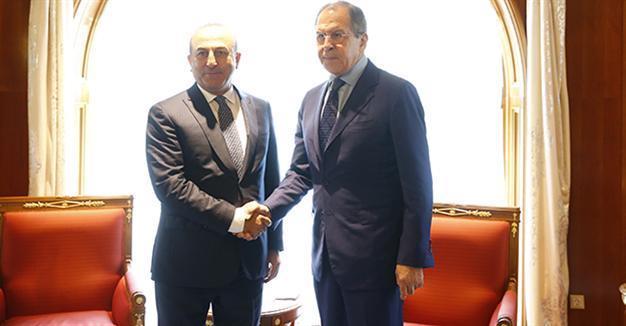Turkish-Russian FMs discuss terror in first meet
SOCHI

AA photo
Turkish Foreign Minister Mevlüt Çavuşoğlu met Russian counterpart Sergei Lavrov in the Russian resort of Sochi at an economic meeting on July 1 in the first face-to-face meeting between the two in seven months after bilateral relations were badly hit when Turkey downed a Russian jet.
The 36-minute meeting at the Black Sea Economic Cooperation meeting (BSEC), focused especially on terror as well as the economy, trade issues, energy cooperation and rekindling bilateral relations.
“We can talk with Russia on every issue, positive or negative, because the dialogue that had been cut has restarted and our relations have begun returning to the old days,” Çavusoğlu told reporters after the meeting which he called “very beneficial and constructive.”
Çavuşoğlu said he discussed with his Russian counterpart about future action, areas of possible activity and how Moscow would implement decisions.
The foreign minister noted that the two countries did not agree on all issues but said the significant mechanisms on both Syria and the Middle East were working well. Accordingly, the minister said the two countries would be in close dialogue in terms of cooperation within institutions, including intelligence.
“There are attacks staged by DAESH [the Islamic State of Iraq and the Levant] and PKK [the outlawed Kurdistan Workers’ Party]. There are attacks by PKK-YPG [the Peoples’ Protection Units]. As Turkey, we are fighting DAESH as Turkey, but both coalition countries and countries like Russia and Iran have to fight more effectively against terror organizations such as DAESH. Turkey will continue its fight against DAESH. In this sense, it is important to facilitate cooperation and coordination between Russian and Turkish security units and security forces in order to prevent unnecessary incidents and accidents from happening,” Çavuşoğlu said, using an Arabic acronym for ISIL.
Meanwhile, Lavrov said the joint work with Turkey on terrorism had become increasingly significant due to the normalization process between the two countries.
Accordingly, the Russian minister said they agreed to restart a “working group on fighting terrorism” and that contacts between the armed forces could improve.
“Our joint work on the fight against terrorism is acquiring particular relevance. Together with the Turkish side, we have set up a bilateral working group on combating terrorism. It comprises representatives of the Foreign Ministry and intelligence services. Over the past seven months, its work has been frozen for obvious reasons, but today we agreed to resume it at an early date. I think contacts will develop through other channels as well, including between the military in the two countries, taking into account the actions of our Air Force in accordance with the invitation of the Syrian government, taking into account the fact that Turkey is a member of the U.S.-led coalition,” TASS news agency quoted Lavrov as saying.
According to the report, Lavrov also pointed out that Russia and Turkey had no differences on the identification of terrorists in Syria.
However, asked whether Moscow understood Ankara’s stance on terror, Çavuşoğlu said he knew Russia was against terror organizations.
“At the same time it is also against the PKK. The YPG opened an office in Moscow. We do not have sufficient information on this subject. We do not have sufficient information on Russia’s stance on the YPG and PYD in Syria. However, we are talking with Russia very clearly. For us there is no difference between the PKK and the PYD-YPG,” Çavuşoğlu said.
Commenting on the Syrian crisis, Çavuşoğlu said Ankara and Moscow should work together for a political solution, noting that the re-establishment of dialogue was also important for the future of Syria.
“The political solution in Syria is the best solution. Therefore, we are already in agreement over the fact that the next regime in Syria has to be secular and inclusive. We also had different views on whether al-Assad would stay or go in the past. Right now, it can be hard to say that we are of the same mind. However, discussing even different views in a clear and sincere way is always beneficial,” Çavuşoğlu said, adding that the country could discuss positive or negative issues with Russia again.
Meanwhile, Çavuşoğlu stated that Russian President Vladimir Putin and Turkish President Recep Tayyip Erdoğan could meet in August in Sochi.
Earlier, the Kremlin said Putin and Erdoğan could meet before the G-20 summit in China in September, as reported by Reuters.
“It looks like now there will be a month or more of pretty intense discussions [with Turkey on restoring ties],” Kremlin spokesman Dmitry Peskov told reporters.
The last time the two foreign ministers met was on Dec. 3, 2015, at the 22nd OSCE Ministerial Council meeting in Belgrade.
Moscow invited Ankara to the economy meeting on June 23, marking a potential warming of ties after seven strained months after Turkey downed a Russian SU-24 jet near the Syrian border for allegedly violating its airspace.
Çavuşoğlu accepted the invitation four days after Erdoğan expressed his “regret and sorrow” over the jet downing incident in a letter to Putin.
